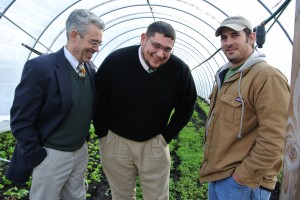Through their Farm to Fork purchases, Goucher College Resident District Manager Norman Zwagil and his team are supporting positive change in the tides of agriculture in the Chesapeake Bay region — and one such purchasing relationship is with Big City Farms, a half-acre of greenhouses right in the middle of Baltimore, built on top of an old parking lot .

Blog: Sourcing
+ Blog Categories

Recipe: Edamame Burgers Topped with Sumac-Spiced Carrot Peels
- Blog
This burger made of millet and edamame is a nutritious and planet-friendly alternative to ground beef. Using carrot peels as a topping also helps to avoid unnecessary food waste.
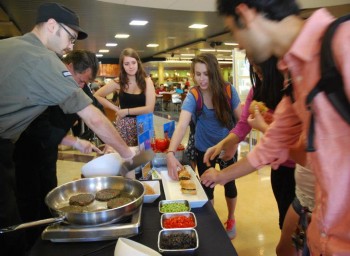
A Hot New Twist on Low Carbon Diet Day
- Blog
Food can be a terrific vehicle to use for educating people about complex topics, and luckily, I work for a company that has an army of chefs who enjoy just this kind of challenge. Bon Appétit was the first food service company to address food’s role in climate change, and every year around Earth Day, our chefs change their menus and explain to their diners at corporations, colleges and universities, and museums in 32 states how their every day food choices affect our planet. For Earth Day today, we’re doing something a little different. Our chefs are standing in front of guests at a cooking demonstration table, making almond-milk-fruit smoothies, cheeseless pizzas, and edamame burgers with carrot peel toppings. They’re talking about how climate change isn’t just this storm gathering way down the road, it’s here and it’s affecting some of our favorite foods.
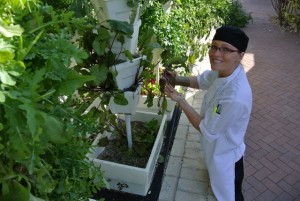
Hydroponic Café Garden Takes Root at Eckerd College
- Blog
At Eckerd College in St. Petersburg, FL, the Bon Appétit team is taking advantage of the year-round sun for a café garden.

Students Share Support for Farmworkers during Farmworker Awareness Week
- Blog
During National Farmworker Awareness Week, March 24-31, Bon Appétit cafés across the country engaged guests on the topic of farmworkers and the difficult working conditions they face, then shared ways for people to stay informed and become involved in the movement.

Celebrating Farmworker Awareness Week, March 24 – 31
- Blog
National Farmworker Awareness Week, hosted by the Student Action for Farmworkers (SAF) and cosponsored by Bon Appétit Management Company, is quickly approaching. March 24-31 is a week dedicated to raising awareness about farmworkers and the conditions they face as participants in a food system focused on keeping prices lower at any cost.
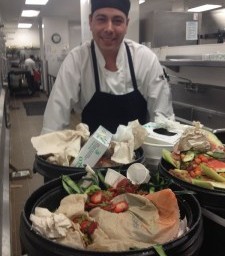
Bon Appétit at VMware Now a Certified Green Business
- Blog
It’s not easy being green, as a certain frog once sang, and it’s even less easy getting your practices certified green. But that’s exactly the feat that BonAppétit at VMware in Palo Alto, CA, accomplished in February, when it became a Bay Area Certified Green Business.
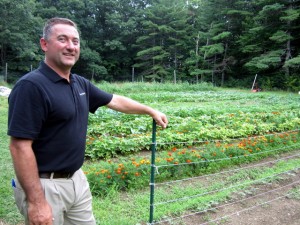
The Bon Appétit Dream Comes Alive at Saint Joseph’s College of Maine
- Blog
Under the leadership of General Manager Stuart Leckie and Executive Chef Christian Bassett, the team at Saint Joseph’s takes what Bon Appétit requires nationwide in terms of social and environmental commitments (no small feat), and pushes each as far as they are able.

Wasting Food is Not Sustainable
- Blog
In the United States, 40% of food goes uneaten. Just so we’re clear, that’s nearly half. Yet one in every six Americans lacks a secure supply of food. Waste is happening at every part of the supply chain: thousands of pounds of fresh vegetables are being left in the fields to rot, blemished produce are being tossed at our supermarkets, restaurants are dumping perfectly good leftovers, and consumers are letting food waste away in their refrigerators. Clearly, we have a problem.

Watch BAMCO’s Maisie Greenawalt Talk Meat at TEDxManhattan Feb. 16
- Blog
This Saturday, February 16, join thousands of “foodies,” “farmies,” and leaders in food and farming in watching the TEDxManhattan: Changing the Way We Eat conference. Bon Appétit is very honored that Maisie Greenawalt, our vice president of strategy, was selected to present. During the third session, Empower, which starts at 4pm EST, Maisie will speak frankly about “How the Humane Sausage Gets Made” — how a large corporation like Bon Appétit decides to tackle animal welfare issues, and what specific challenges we face in meeting our aggressive deadline of 2015 to end all purchases of pork raised without gestation crates.
